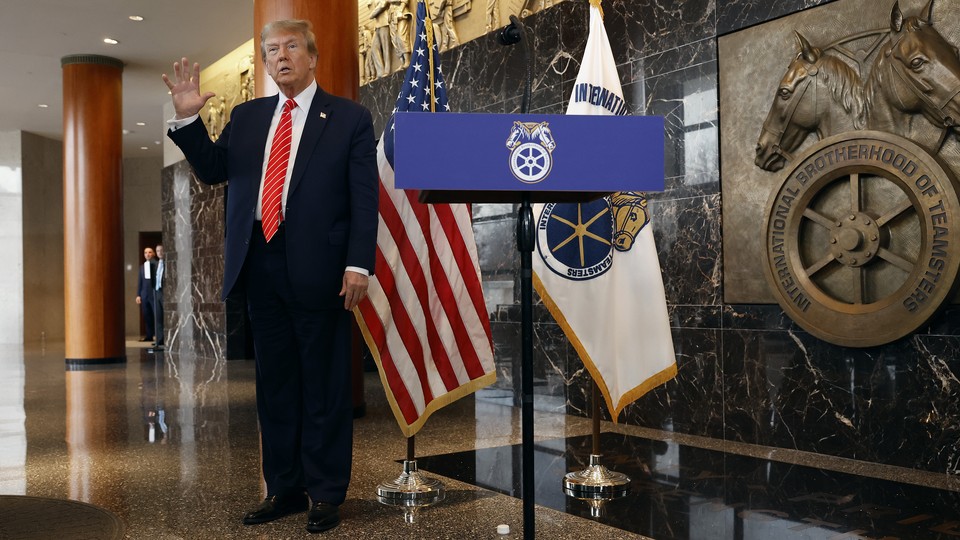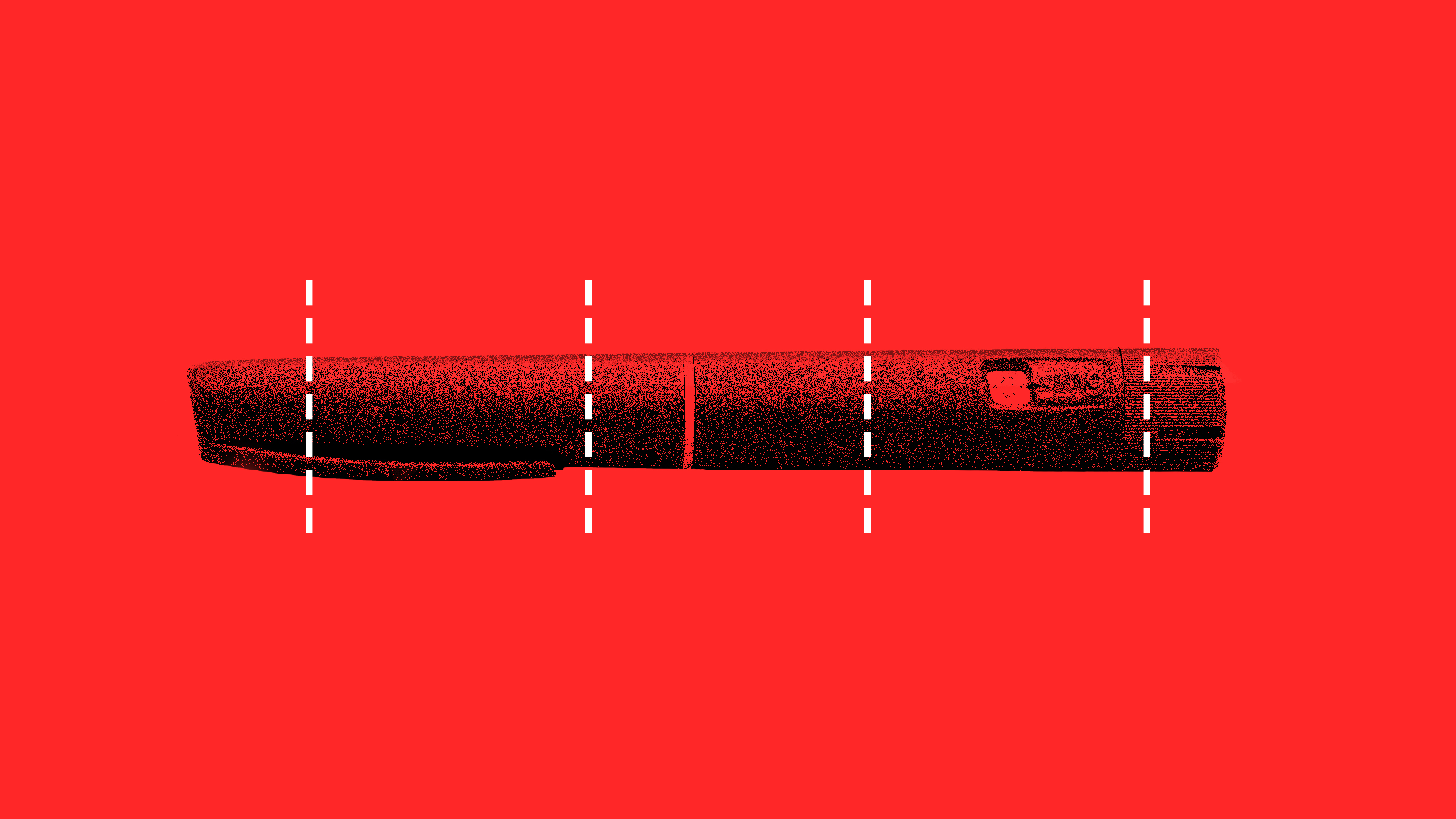Trump’s Strike-Busting Comments Could Come Back to Haunt Him
6 min read
This is an edition of The Atlantic Daily, a newsletter that guides you through the biggest stories of the day, helps you discover new ideas, and recommends the best in culture. Sign up for it here.
Donald Trump’s recent comments about firing union workers for going on strike could come back to haunt him in this election.
A Sharp Contrast
In a freewheeling and chaotic livestreamed conversation with Elon Musk on X this past Monday night, Donald Trump complimented Musk on his “fertile mind,” celebrated the prospect of climate change creating more oceanfront property, and said that Vice President Kamala Harris resembled his own wife on a recent Time cover. But the moment when Trump praised the idea of firing workers on strike could be the one he comes to regret this election season.
“You’re the greatest cutter,” Trump said to Musk. “I mean, I look at what you do. You walk in and you just say, ‘You want to quit?’ They go on strike. I won’t mention the name of the company, but they go on strike, and you say, ‘That’s okay. You’re all gone. You’re all gone.’” (It wasn’t clear what action of Musk’s, real or imagined, Trump was referring to; Musk did axe a majority of Twitter’s workforce after he took over in 2022, and the National Labor Relations Board (NLRB) ruled in 2021 that Tesla had illegally fired a worker who was trying to form a union.) Musk laughed, and Trump pivoted to another topic. The whole exchange lasted about 20 seconds, but the backlash was swift: The United Auto Workers (UAW) union promptly filed federal labor charges against Trump and Musk. As my colleague Charlie Warzel wrote this week, the comments made Trump sound like “a caricature of a heartless industrialist.” And in angering unions, Trump is in danger of turning a powerful force for voter mobilization against himself.
Although Trump tries to present himself as a champion of the working class, his populist rhetoric doesn’t always align with his policy positions. As president, for example, Trump appointed NLRB members who made it more difficult for workers to unionize and judges who were skeptical of organized labor. He opposed the PRO Act, legislation that passed the House in early 2020 that would have opened the door for more workers to conduct union campaigns, as well as heightened penalties for companies that impinged on workers’ rights. The Republican National Committee, in an effort to highlight the Trump campaign’s attention to labor interests, invited Teamsters President Sean O’Brien to speak at the Republican National Convention earlier this summer. But as my colleague David Graham noted last month, Trump has also criticized the UAW for striking, and spoke at a nonunion auto-parts factory during the strike. His running mate, J. D. Vance, has sometimes broken with GOP orthodoxy to support workers and attack corporations, but he has an inconsistent record on labor issues. In 2016, Trump secured a higher share of the union vote than other Republican candidates in the recent past; Joe Biden won union households by a wide margin in 2020, and with them, the election.
So Trump’s comments on Monday night could come back to haunt him in November. “Trump handed the union leaders such a gift,” my colleague Ronald Brownstein, who has covered the relationship between labor and American elections, told me in an email. Trump’s remarks make it easier for union leaders, many of whom do not support Trump, to build a case against him, Ronald explained; in modern politics, a gap often exists between the policy commitments of union leaders and the priorities of members, he noted. Trump’s comment will allow Democratic-supporting union leadership “to portray Trump as a threat,” Ronald said, including to the culturally conservative members who may otherwise be attracted to some of Trump’s messages on issues such as crime and immigration.
Union members make up a small but meaningful contingent of voters, especially in swing states such as Wisconsin, Pennsylvania, and Michigan. In those states, 14, 18, and 21 percent of all voters in the 2020 election lived in union households, respectively, according to exit polls (though not everyone living in a union household is necessarily a union member). We’re likely to see a close election this fall, and nabbing those slices of the electorate may help shape the outcome. Unions can be powerful forces in elections for their sheer ability to mobilize people to turn out to vote, Tobias Higbie, a labor historian at UCLA, told me. He also noted that union voters aren’t a monolith: The country’s 14 million union members vote with different priorities.
For Biden, supporting unions was a way to frame himself as being on the side of the working class while also distinguishing himself from Trump’s non-union-friendly populism, William P. Jones, a historian at the University of Minnesota, told me. Since the 1980s, Jones said, Republicans have pushed the idea that politicians can be pro-worker but not pro-union. For a long time, Democrats did not challenge that framing, in part because the general public has experienced periods of ambivalence about unions (public approval for unions has gone up over the past decade). But Biden—who has claimed to be the most pro-union president in American history and largely made good on that claim—rejected this approach.
Harris hasn’t released any union-specific policy proposals so far. But she has long supported unions, and UAW and other unions have endorsed her. “Walz brings a really decisive answer” to the question of whether she’d take Biden’s approach, Jones argued. As a union member who has successfully mobilized union voters in Minnesota races (and delivered policy wins to union contingents once elected governor), Walz is a natural messenger for working and union-member voters. And he already leaned into his labor bona fides in his first solo campaign stop this week. Addressing a ballroom full of union members in Los Angeles, Walz promised that he would fight for working Americans and warned that Trump would wage war on working people. So far, these are just campaign promises. But as far as political images go—and they can go far—Walz’s working-man persona is a sharp contrast to the “heartless industrialist” hat Trump wore on Monday night.
Related:
-
The fakest populism you ever saw
-
Why Biden’s pro-worker stance isn’t working
Today’s News
-
Tim Walz and J. D. Vance have agreed to participate in a debate hosted by CBS on October 1.
-
Multiple people have been charged in connection with the actor Matthew Perry’s death, which was attributed to a ketamine overdose.
- Ukraine announced that it has appointed a military commander to manage the parts of Russia’s Kursk region it has gained control over.
Dispatches
- Time-Travel Thursdays: America’s battle over Darwinism was personal, Evan McMurry writes.
More From The Atlantic
-
Ocean Photographer of the Year 2024 finalists
Evening Read

Why People Are Breaking Open Their Mounjaro Pens
By Sarah Zhang
By the time Lisa started breaking open her Mounjaro pens with pliers, she had run out of other ideas. She was 300 pounds. She had already tried bariatric surgery. (It had limited success.) She had tried getting her insurance company to cover Mounjaro. (It stopped after a month.) She had tried a cheaper copycat version from a compounding pharmacy. (It didn’t work as well, and she worried about what she was actually getting.) “I was absolutely desperate to stay on,” she says, but she could not afford the sticker price.
That’s when she learned online about a money-saving loophole: She could split a maximum-strength Mounjaro pen into the smaller doses she needed. (The single-use injection pens come in multiple concentrations that cost the same.) One pen became as many as six. A year of dose-splitting later, she has lost 75 pounds—at a fraction of the original cost.
Read the full article.
Culture Break

Read. “Beauty,” a short story in which Graham Swift explores loss and the unexpected rekindling of romance: “She’s beautiful. Some inner voice that he thought he’d lost years ago had said it, even in such brazen language.”
Watch. One of these six acclaimed movies with short runtimes.
Play our daily crossword.
When you buy a book using a link in this newsletter, we receive a commission. Thank you for supporting The Atlantic.



